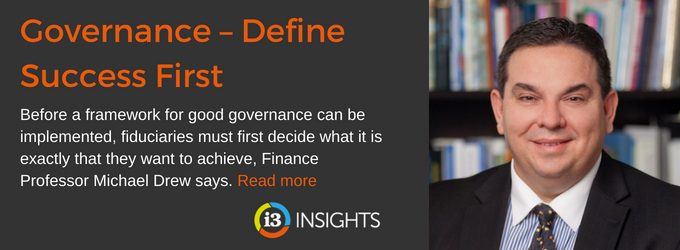Pension funds should step up their game in investment governance and best practice if they are to remain relevant in the changing investment industry.
As asset owners, consultants and fund managers are increasingly encroaching on each other’s territory, only those with superior decision making processes in place will survive, according to Sue Brake, Senior Investment Consultant at Willis Towers Watson.
“This is no longer a nice to have; in this environment, change is imperative. It’s not about throwing grenades because I really want to help, but there are things that need to happen,” Brake says.
Brake emphasised that her comments should not be seen as a general criticism of boards’ performance, but merely as a well-intentioned nudge to step up on investment governance.
“It stems from the belief that great governance is rewarded with materially better outcomes than good or poor governance; you have to be best practice if you are going to compete,” she says.

In general, boards are focused on the oversight part of their responsibilities – but they haven’t fully engaged with the strategic dialogue to be able to unlock the governance premium
“In general, boards are focused on the oversight part of their responsibilities – but they haven’t fully engaged with the strategic dialogue to be able to unlock the governance premium.”
One of the key areas where asset owners tend to get stuck is in establishing clarity around who is responsible for what part of the investment decision-making process.
Too often boards of pension funds make the final investment decision, while their role should be one of strategic direction.
“In Australia, boards are getting caught in the weeds. They are getting far too involved in micromanagement,” Brake says. “The job of the board and investment committee is strategic dialogue and disciplined oversight.
“We’re still finding that the board and the investment committee are making the investment decision as opposed to thoroughly examining the framework by which decisions are made and then having a strategic dialogue about them.”
“If you talk to an investment executive, they will identify this as a problem. But if you talk to the boards, they will say: ‘No. We are doing a great job’.
“And boards are doing a great job, but there are some specific aspects of investment governance that are quite unique. This idea that ‘governance is governance’ and it shouldn’t matter what you are covering… well, I would refute that.”
In 2016, Willis Towers Watson published a paper titled ‘The investment case
for better asset owner governance’– that put a basis point figure on good governance. The concept that good governance adds to returns is an important starting point, but the dialogue needs be accompanied by some sense of urgency, Brake says.

It is very hard sometimes for the board and the executives to have those conversations, because there is an asymmetry in information and asymmetry of power
Yet often internal structures can make this difficult to achieve without external help.
“It is very hard sometimes for the board and the executives to have those conversations, because there is an asymmetry in information and asymmetry of power,” she says.
“Sometimes it is about the chair; if the chair is open to feedback, then you can work things out. In the end, it is about clarity of who is responsible for making what decision.
“Delegation matrices can be very convoluted and you lose sight of what is actually meant. So you have to get that straight – and you don’t only do it once, you have to make it very clear time after time,” she says.
This also could result in better efficiencies for all participants.
“These 300-page investment committee monthly packs just blow my mind,” she says. “You are expecting your directors, meeting every month, to have an opinion on 300 pages of material? How can that be good governance?
“So we have taken a big red pen to reporting packs and say: ‘Here are your responsibilities and here is the information you need’, rather than presenting all of the information that is to hand.
“Big gains can be made from clarifying who decides what,” she says.
__________
[i3] Insights is the official educational bulletin of the Investment Innovation Institute [i3]. It covers major trends and innovations in institutional investing, providing independent and thought-provoking content about pension funds, insurance companies and sovereign wealth funds across the globe.


